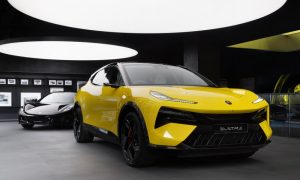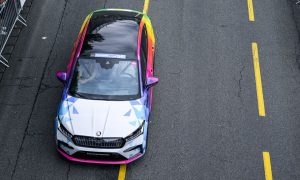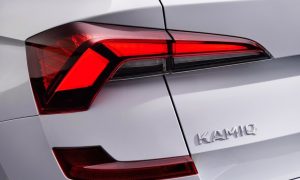 For yesterday’s opening of the new Product Engineering Centre in Beijing, Mercedes-Benz put the focus squarely on the G‑Code vehicle study. The innovative and versatile Sports Utility Coupé (SUC) for town and country shows how emotionally appealing a future compact SUC can be, and what evolutionary possibilities the Mercedes‑Benz design philosophy offers. The new Product Engineering Centre of the brand bearing the three-pointed star also features a complete design studio. Under the leadership of the main studio in Sindelfingen, the studio in Beijing creates design models and mobility concepts that incorporate and focus on local cultures and trends. Consequently, this new Advanced Design Studio within the Daimler Product Engineering Centre in Beijing also pursues an already established strategy of Daimler. Worldwide a total of five such centres serve as “seismographs” for market-specific developments. The knowledge gained there is then incorporated into the technical concept and design of future models.
For yesterday’s opening of the new Product Engineering Centre in Beijing, Mercedes-Benz put the focus squarely on the G‑Code vehicle study. The innovative and versatile Sports Utility Coupé (SUC) for town and country shows how emotionally appealing a future compact SUC can be, and what evolutionary possibilities the Mercedes‑Benz design philosophy offers. The new Product Engineering Centre of the brand bearing the three-pointed star also features a complete design studio. Under the leadership of the main studio in Sindelfingen, the studio in Beijing creates design models and mobility concepts that incorporate and focus on local cultures and trends. Consequently, this new Advanced Design Studio within the Daimler Product Engineering Centre in Beijing also pursues an already established strategy of Daimler. Worldwide a total of five such centres serve as “seismographs” for market-specific developments. The knowledge gained there is then incorporated into the technical concept and design of future models.
The G-Code concept vehicle is a prime example of this strategy: it interprets the current design idiom of sensual purity from the perspective of the Mercedes-Benz advanced designers in Beijing and Sindelfingen. The combination of emotion and intelligence conveys modern luxury in a compact form. As a result, the G-Code is also a perfect fit for today’s understanding of design in China. “The G-Code is both beautiful and intelligent, and interprets our typical Mercedes Coupé design idiom”, says Gorden Wagener, Head of Design of Daimler AG. A coupé-like side line, a dynamically flowing greenhouse and extremely sporty proportions immediately catch the eye. Furthermore, compact dimensions, extensive assistance and camera systems as well as the variable plug-in hybrid drive system with long electric operating range make the SUC ideal for traffic in Asia’s mega-cities. At the same time, the electronic all-wheel drive technology with “digital prop shaft” ensures a particularly sporty and energy-efficient set-up both on and off the road.
G-Code: inspired by the urban lifestyle of Asia’s metropolises
The designers of the G-Code drew their inspiration from the modern lifestyle and digital affinity of the younger Asian society. In the future, this generation will prefer above all cool and sporty crossovers, as prior studies conducted by Daimler have shown. At the same time, the G-Code initiates an automotive trend that focuses on new technologies, classic craftsmanship and design.
With the G-Code the employees of the Advanced Design Centres in Beijing and Sindelfingen not only implement technical innovations, but also provide a look ahead to the evolutionary possibilities of the Mercedes-Benz design philosophy of sensual purity. The 2+2-seater SUC measures about 4.10 metres in length and has counter-opening doors. It captivates with a coupé-like profile, muscular wheel arches and a continuous greenhouse without visible A-pillars. This continuous glass area – similar to the cockpit glazing of a powerboat – lends the G-Code, which is about 1.90 metres wide and only about 1.50 metres tall, a coherent horizontal arrangement and a resounding forward thrust even while at a standstill. This solution seems to literally levitate the roof with its retractable roof rails and tension-charged surfaces above the vehicle body, and signals the lightness of automotive being.
In addition to the striking “muscles” that span from the headlamps to the rear and lend the side a purist and flowing line, the 21-inch aluminium wheels with delicate carbon-fibre spokes catch the eye in the side view. They provide an interesting contrast to the harmonious side line of the G-Code.
The short front and rear overhangs, the enlarged ground clearance and the front and rear aluminium underride guard hint at the SUV talents of the G-Code. The aforementioned wheels give the compact SUV a solid stance on the road and leave no doubt about its passion: even at first glance the vehicle study signals its sporty ambitions both on and off the road.
A digital world in the radiator grille: regards from the “warp drive”
Who hasn’t heard of the legendary Starship Enterprise from the Star Trek TV series and the numerous feature films. One feature which has always been the centre of attention is the warp main drive in the lower drive pod with holographic, most often blue-illuminated pulsating opening. The designers have created a similarly spacey front for the G-Code. In place of a conventional louvred grille, the central trademark star and the two chrome louvres in the radiator are surrounded by a continuous display. The engine is cooled by means of innovative air deflection via apertures in the side and at the bottom of the front. The inspired display visualises the current operating mode of the G‑Code with a complex and multi-layered star matrix:
- When the G-Code is parked, it signals the current rest mode with a softly pulsating blue light.
- In all-electric HYBRID eDrive mode, the digital miniature stars in the radiator grille light up in blue and seem to move from the edge of the display towards the centre. It creates the visual impression of an imaginary permanently opening tunnel in the vehicle front.
- In the mixed HYBRID eco mode, the direction of movement of the miniature stars remains the same, but the colour changes to a purple hue.
- In HYBRID sport mode on the other hand, the colour changes to a vivid red and the direction of movement of the miniature stars is reversed. Now it creates the impression of the G-Code permanently transporting imaginary energy to the outside.
Attractive exterior details demonstrate high tech
The two full-LED headlamps are further eye-catchers at the front in addition to the innovative radiator grille. When they are switched on, they extend from the depth of the headlamp like the lens of a digital camera and focus the light in line with the driving and traffic situation. In addition, the daytime running lamps in the shape of a stylised “G” attract attention. The two cameras in the small flics at the top of upper A-pillar are retractable too. They replace the classic rear-view mirrors and retract flush into the A-pillars after the G-Code is parked. An LED light strip across the entire rear provides a stage for the G‑Code with various illuminations for turn indicators, tail lights, and brake lights.
Interior: the digital world meets hallmark Mercedes feel-good atmosphere
Despite its compact dimensions the G-Code is a 2+2-seater with great variability. The interior visualises the designers’ idea of combining the practical talents of an SUV with the emotional appeal of a sports car. The interior specialists deliberately let digital and analogue worlds collide. This combination of classic elements and state-of-the-art high tech stimulates the senses and provides the occupants of the G-Code with an even more authentic experience.
The act of getting into the G-Code is an experience in itself. Thanks to counter-opening doors and the elimination of a B-pillar, the G-Code offers unrestricted access to the interior for driver, front passenger and passengers in the rear. The process of taking a seat at the wheel could not be more impressive. After the driver has taken a seat in the most comfortable of fashions and has activated the vehicle by means of a smartphone, the instrument panel and pedals automatically extend from their rest positions and move into the most ergonomic position for the driver that also offers the best tactile experience. Then the steering wheel, which rests in the instrument panel, unfolds like a butterfly and together with the integral head-up display also moves into a perfect position. The finale of the getting-in ceremony is provided by the air vents and the multi-information display that extend from the instrument panel. The wide-screen display spans almost the entire width of the instrument panel and provides a clear overview of the various vehicle and multimedia functions, all of which feature intuitive control. The images from the rear-view cameras are superimposed at the edges of the wide-screen display. When the G-Code is switched off with the smartphone, the moving elements in the interior revert to their original positions to ensure a comfortable and ergonomic exit.
Of course the G-Code is equipped with the most innovative driver assistance systems with 360-degree monitoring of the surroundings via 3D cameras, radar, infra-red scanner, GPS data and an exchange of large volumes of data with the traffic infrastructure and other vehicles in the vicinity. Potentially critical driving and traffic situations are already detected as they develop and defused automatically.

The interior: anything but painting in black and white
In the interior of the G-Code a striking contrast between dark and light areas signals clarity. In addition to the stylistic appeal it exudes, there is also a technical reason behind this colour scheme. While black components such as the dirt-resistant floor covering or the carbon-fibre seat structure are supposed to visualise stability, durability or utility, the white interior components such as the soft leather upholstery on seats and armrests embody comfort and wellness. The high-contrast interior exudes modern luxury and at the same time provides the perfect stage for orchestrating the individual modes of the hybrid drive system. Similar to the visualisations of the display in the radiator grille, the interior lighting also varies, with the large wide-screen display adopting both the star matrix and the colour schemes.
The centre console creates the harmonious link between digital and analogue world. The docking station in particular stands out, which networks the personal smartphone with the G-Code for switching it on and off and for communication purposes. Depending on the personal configuration, the central display shows a wide variety of functions of the mobile device. Controls with a high-quality finish and classic design such as the switches, buttons and rotary controller as well as the aluminium grab handles hint at the analogue world.
The high-quality seats with a shell-like design and a mix of carbon fibre and leather resemble sculptures. In addition, they are equipped with 3D body scanners that monitor important physical parameters and can optionally show the degree of wellness of all occupants on the central display. Depending on the measured values, massage, heating or cooling functions are automatically activated in the seats, which help prevent fatigue or eliminate muscle tension already at a very early stage. This ensures relaxed travelling even on longer journeys.
The air conditioning system boosts the wellness programme by cleaning the incoming air naturally by means of photosynthetic emissions scrubbing before ionising it to ensure an interior atmosphere free of allergens and particulate matter. The oxygen produced during the hydrogen synthesis as part of the drive management system is routed to the interior as needed, and provides an additional refreshing effect for the occupants. As a result, even urban stop-and-go traffic in congested Asian metropolitan areas sheds its unpleasant aspect.
Intelligent packaging of all chassis components and the effective and variable use of the interior are of particular importance in the case of compact vehicles such as the G-Code. The G-Code not only offers sufficient room for up to four people, it also provides adequate stowage space. For example, of note are the two mini stand-up scooters below the double luggage compartment floor, which are recharged while driving and offer additional mobility in the city after parking.
Everything in flow: visionary drive technology
The technical visions in the G-Code clearly incorporate quite fantastical aspects and by no means raise the claim of wanting to pave the way for specific future technologies to enter into mass production, unlike the research vehicles from Mercedes-Benz. But the G-Code describes ways that our grandchildren might one day consider the state of the art. As such, the compact SUC, like the previously introduced Ener-G-Force and GT 6 vehicle studies, makes absolutely no claim to be implemented within foreseeable periods.
The power of two individually controlled drive cores acts in the G-Code. The engine at the front is a compact, state-of-the-art turbocharged combustion engine that runs on hydrogen and solely drives the front wheels. An electric motor drives the rear axle and transmits its power selectively to the two wheels via a dual multi-disc clutch.
The G-Code also impresses with the decentralised generation of electricity. In addition to the by now classic energy intake by means of regeneration or plug-in technology, the high-tech “multi-voltaic silver” paint finish also ensures the power supply in the SUC of the future. On the one hand, it acts like a giant solar cell with excellent efficiency. On the other, “multi-voltaic silver” is also charged electrostatically by the relative wind or by the natural wind when the vehicle is stationary. These electrical charges are tapped and likewise used for the methane and hydrogen synthesis. Finally, the special “power on the move” suspension aids in the generation of electricity. Springs and dampers are hydraulic and networked via a central control unit. The rebound of the springs and dampers and thus the flow of hydraulic fluid drives a compact current generator.
Innovative all-wheel drive with “digital prop shaft”
Depending on the selected mode, the G-Code can operate as a front-wheel drive vehicle powered solely by the combustion engine, as an all-electric rear-wheel drive vehicle or fully variable in all-wheel drive mode. A completely newly configured system controls this innovative all-wheel drive system. It combines the two power sources as demanded by the current driving situation. The powertrain control acts as a “digital prop shaft” between front and rear axle. Which drive mode is the most sensible in any given situation is not only determined by aspects of economy. Driving dynamics parameters are also incorporated to enhance active safety or boost longitudinal and lateral dynamics in HYBRID sport mode, for example. At the same time, the control logic always ensures steady and, for the driver, predictable handling characteristics independent of the respective front-wheel, rear-wheel or all‑wheel drive mode.
HYBRID select: a variety of modes for all conditions
The HYBRID select driving dynamics system offers three specific modes:
- In HYBRID eDrive mode the G-Code is set up for maximum all-electric operation. The control strategies of this mode focus on maximum energy efficiency and maximum drive system comfort.
- When the driver activates HYBRID eco mode, the focus is on maximum drive system comfort in addition to maximum hybrid efficiency. The digital sound modulation compensates acoustically for the alternating or simultaneous use of the electric motor and the combustion engine, and generates a subdued, pleasant soundscape in the interior.
- In HYBRID sport mode, the occupants experience the G-Code as a driving machine on the level of a compact sports car. For maximum longitudinal and lateral dynamics the electric motor is used as a booster during acceleration. For spirited driving on twisty roads, torque vectoring on the electrically driven rear axle significantly increases agility. The digital sound modulation also lets the occupants experience the soundscape of a powerful sports car equipped with a flap exhaust system.
Source: Mercedes-Benz
Previous article
Chevy Colorado Performance Concept Enables Adventure [VIDEO]



